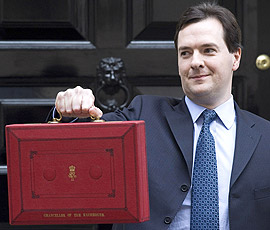Little for farmers in Budget 2012

There was little for farmers to shout about in Wednesday’s (21 March) Budget by Chancellor George Osborne, despite some positive changes to tax regimes.
Many had hoped for measures to benefit rural businesses, such as a further deferral of the planned fuel duty rise, or a rethink on the reduction in annual investment allowances, but were left disappointed.
The Chancellor said there would be no changes to the fuel duty plans already set out, so the 3p rise deferred until August looks likely to go ahead, while the AIA will be cut to £25,000 from next month.
“There doesn’t seem to be the detail in the Budget this year and nothing specifically targeted at farmers,” said Landtax consultant Carlton Collister. “I think they’re delaying some of the detail until the Finance Bill next Thursday.”
But the increase in personal tax allowances to £8105 this year and £9205 from next April would benefit many, while a reduction in the top rate of tax to 45% from April 2013 would benefit higher earners, he said.
“As always the devil is in the detail,” said NFU Mutual’s Tim Price. “At first glance, I’d say that higher income tax allowances aren’t going to be enough to cover the higher fuel prices farmers and country people will be paying as a result of higher oil prices and extra duty.”
Budget highlights:
- Personal tax allowance increased
- Top tax rate cut
- Corporation tax rate cut
- New residential stamp duty rate
- No change to fuel duty plans
- No movement on AIA cuts
- Target to double exports by 2020
- Cuts to child benefit
The cut in the main corporation tax rate by 1% from next month to 24% and further cuts taking it to 22% in April 2014 was welcomed.
“The reduced corporation tax may encourage farm businesses to be run through corporate entities, although this should be balanced with the tax payable on extracting funds and assets from the company – and care must be taken not to buy properties through the company,” said Claire Harris of Withers Law firm.
A simplification of the taxation of small businesses – details due soon – was likely to ease the administrative burden on smaller rural businesses, she added.
Another potential “nugget” for the countryside was the introduction of enterprise loans for young people starting up their own business, said NFU Mutual’s Sean McCann.
But other measures, such as a restriction of tax relief on losses could have a negative impact on larger farms with variable trading results from year to year caused by fluctuations in prices and input costs, said Andrew Arnott.
Farmhouses were likely to escape the new Stamp Duty Land Tax rate of 7% for properties over £2m, which only applied to residential properties.
“Not sure the rhetoric tallies with the measures proposed. Some positives on exports, but as we’ve already had export strategy for food from Defra in recent weeks, what more could be expected?” Phil Bicknell, NFU
“Renewable energy has to be ‘fiscally sustainable’ – lower FiTs?” Andrew Shirley, Knight Frank
“Funding for ultra-fast broadband seems to be focused on cities rather than rural areas at present.” Claire Harris, Withers Law
“Corporation tax at 24% and coming down to 22% does make the UK very competitive.” Nick Tapp, Bidwells
“Child benefit to be withdrawn when someone in the household reaches income of £50k, reducing gradually to nothing when income reaches £60,000. Not simple at all.” Catherine Vickery, Old Mill
